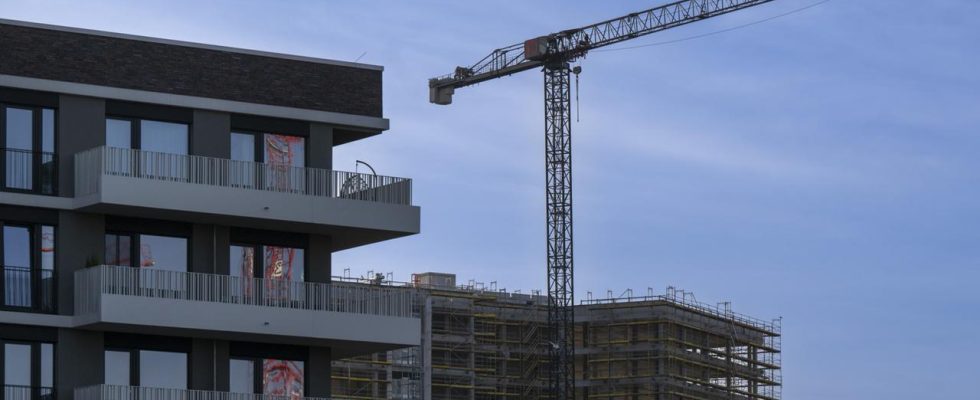In the debate about the ailing housing construction, Minister of Construction Geywitz is moving away from the plan to tighten the energy standards for new buildings. In view of the high construction costs and declining applications, it is not the time for this.
Federal Building Minister Klara Geywitz opposes the increase in energy standards for new buildings actually planned by the traffic light government. “In my view, the situation now is not such that there should be further tightening of the standards for construction prices and the sharp drop in building applications,” said the SPD politician to RTL / ntv.
Geywitz was referring to an agreement in the coalition agreement between the SPD, the Greens and the FDP, according to which the EH-40 energy efficiency standard is to be prescribed for new buildings from January 2025. This would tighten the specifications for the thickness of the insulation.
Building Energy Act and aid package planned
Stricter insulation requirements would increase construction costs, a ministry spokeswoman said. Geywitz therefore asks whether insulation is a panacea or whether the life cycle costs of a building should be considered. The draft for a building energy law on these questions is now being worked out with the economics department, about which the houses started talking “promptly”.
Geywitz wants to present an aid package for the ailing construction industry in September. “It is important that we set an impulse in such a situation,” she said on Sunday. The construction industry needs a boost in demand because credit financing has become significantly more expensive. There will be help as part of the so-called Growth Opportunities Act by Finance Minister Christian Lindner (FDP). In the current adjustment phase with higher interest rates, the worst thing would be to reduce construction capacity.
Lang calls for investment in social housing
Geywitz rejects the proposal by Green party leader Ricarda Lang to promote social housing through public investment companies. “What you shouldn’t do if the constitution provides for a debt brake is to find a shortcut now,” said the SPD politician.
In an interview with the dpa news agency, the Greens leader had pleaded for bypassing the debt brake. “Without any impact on the debt brake, we can easily equip the railways or the Federal Agency for Real Estate Tasks in such a way that they meet the challenges of our time,” explained Lang. The Federal Agency for Real Estate (Bima) could then invest in social housing.
The parliamentary group leader of the Greens in the Bundestag, Katharina Dröge, also spoke out in favor of more state funding. “The construction industry can provide impetus for the economy, jobs and climate protection,” she explained. “In order to strengthen your order situation and to create affordable and energetically high-quality living space, we propose a program that significantly increases state funding for energy-efficient building renovation and social housing.” At the end of last year there were around 1.088 million social housing units in Germany – around 14,000 fewer than a year earlier.
Housing crisis deepens
Overall, residential construction in Germany is on the decline, there are fewer and fewer new orders, existing orders are being cancelled. On Friday, the Federal Statistical Office published new figures on building permits: In the first half of 2023 there were around 50,600 fewer than in the first half of 2022 – a slump of 27.2 percent.
The Ifo Institute had also sounded the alarm: In July, a good 40 percent of the companies surveyed by the Ifo complained about a lack of orders, after 34.5 percent in June. Since spring 2022, a striking number of order cancellations in residential construction have been observed. The main reason for the problems is that the sharp rise in interest rates and construction costs is making house building unprofitable for many property developers.
Because of the enormous demand, especially in the cities, the traffic light coalition had targeted the construction of 400,000 new apartments per year in the coalition agreement – 100,000 of them social housing. In view of the current situation in the construction industry, the goal is a long way off.

